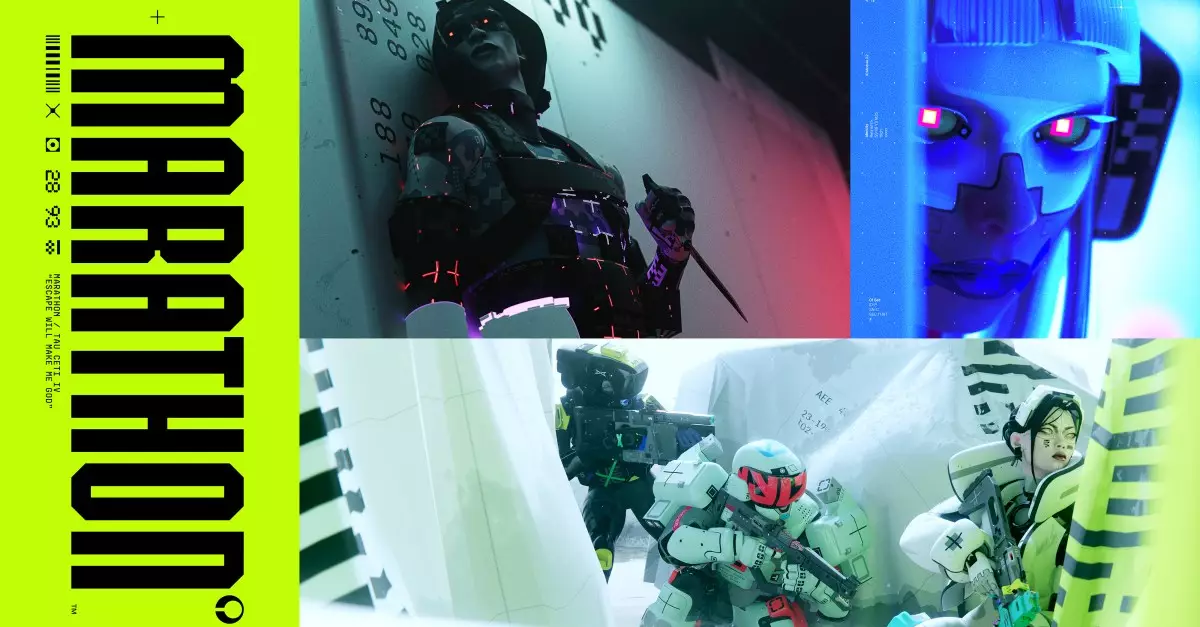The anticipation surrounding Bungie’s latest title, Marathon, has reached a fever pitch as the developers prepare to enter the alpha testing phase later this month. Setting the stage for what could be a groundbreaking entry into the extraction shooter genre, this game not only resurrects an iconic IP but also establishes itself as a frontrunner in a competitive market. With its developer pedigree spanning classics like Halo and Destiny, Bungie is armed with years of experience and creativity that fans are eager to witness.
The decision to integrate multiplayer mechanics in a PvPvE format reflects a savvy understanding of the current gaming ecosystem. By allowing players to team up in crews of up to three, Bungie encourages cooperative strategic play while still presenting a formidable challenge with rival teams. This balance is crucial as games in this genre increasingly require both individual skill and team synergy to emerge victorious. As a staunch gamer, I’m intrigued by how effectively they’ll implement these features and whether it’ll stand the test of time in the ongoing war between FPS titles.
Exploring the Intriguing Sci-Fi Setting
Set in the year 2850 on the desolate Tau Ceti IV, Marathon takes players into a world brimming with mystery and exploration. The backdrop is not merely a visual feast; it enhances the gameplay by immersing players in a narrative-driven environment filled with shadowy factions and forgotten histories. The concept of Runners—players who have chosen to abandon their humanity for enhanced capabilities—adds a rich layer of lore that could captivate both newcomers and seasoned fans of Bungie’s storytelling legacy.
This world, inhabited by hostile PvE creatures and remnants of former civilization, presents a dangerous playground for Runners aiming to secure valuable loot. However, this layered gameplay suggests that players will need to navigate both environmental threats and rival teams, pointing to the need for a flexible play style. The design ethos resonates deeply with the core philosophies of past Bungie titles, emphasizing the weight of decision-making in moments of conflict.
Dynamic Run Strategies and Character Choices
Players will have a choice between runners with unique abilities that cater to varied play styles, which is reminiscent of role-playing elements. This strategy fosters team diversity and encourages players to think critically about their composition and interactions. The array of characters—from stealth-oriented types to those designed for brute force—provides an unprecedented level of customization that could appeal to a broad spectrum of gamers.
In particular, the individual skills of characters like Void and Locus reveal Bungie’s thoughtful consideration of diverse gameplay experiences. With four runners available in the alpha test and plans for additional choices at launch, the variety will keep players engaged. However, it raises questions about the potential for character imbalance and how Bungie will maintain a fair system as more players join the fray.
Visuals and Artistic Direction
One of the standout features of Marathon is its vibrant visual palette that sets a new standard for artistic excellence in first-person shooters. The environments are not just arenas for combat; they serve as active components of the gameplay experience. From colorful landscapes to intricate weapons designs, every pixel feels intentional, creating an engaging atmosphere that invites exploration.
Moreover, the prospect of a cinematic tie-in crafted by talented directors signifies Bungie’s dedication to weaving storytelling throughout the gaming experience. This holistic approach speaks to the studio’s ambition to elevate not just playing, but also experiencing the narrative—a trend that, if executed well, could redefine the standards by which future games are judged.
High Stakes in a Crowded Market
As Marathon prepares for its alpha release, the stakes could not be higher for Bungie. The competitive landscape of shooters is littered with the remnants of past failures and underwhelming titles, including notable flops that linger in the gaming community’s collective memory. This backdrop intensifies the pressure on Bungie to deliver a refreshing and polished experience that both captivates long-time fans and entices newcomers.
Upcoming releases, particularly from rival studios, emphasize the importance of differentiation. For Marathon to carve out its niche, Bungie must present a compelling value proposition that distinguishes it from similar titles. The unique interplay between PvP and PvE elements opens a wealth of tactical possibilities, but gamers will inevitably be questioning how it will compare to juggernauts like Call of Duty and Escape from Tarkov.
The impending alpha test not only offers insights into gameplay mechanics but also serves as a litmus test for player reception. As Bungie navigates the fine line between innovation and expectations, the success of Marathon could very well define its future trajectory in the increasingly crowded gaming ecosystem, and I remain eager to see how this iconic studio rises to the challenge.

